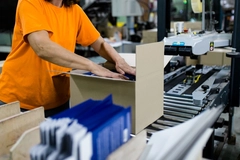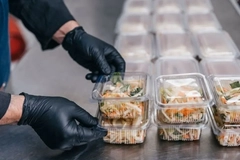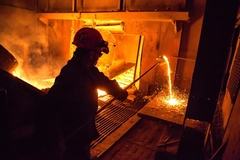New wine in recycled bottles
17 Oct 2010

Co-owners of Sustainable Packaging Solutions Dave Williamson and Brandon Doss have opened a business at Nacet that hopes to convince wine lovers to use their refillable wine bottles.
Co-owners of Sustainable Packaging Solutions Dave Williamson and Brandon Doss have opened a business at Nacet that hopes to convince wine lovers to use their refillable wine bottles.
Environmentally friendly "green" wines have been touted by various wineries for several years, promoting their eco-friendly and long-term sustainable practices.
But most are shipped in a glass bottle that likely comes from a California-based winery. Even if the bottle is recycled, the carbon footprint to get a glass of Napa Valley's finest onto the dinner table is fairly large.
But what if that wine bottle could be reused indefinitely?
The answer to that question is the basis for a new business here in Flagstaff that is set to recycle and reuse wine bottles: Sustainable Packaging Solutions.
Founder Dave Williamson will introduce two varieties of his Kind Vines brand wine into Bashas' here in Flagstaff sometime next month, a Chardonnay currently priced at $7.99 and a Cabernet Sauvignon for $9.99.
The premise will have wine aficionados buying a bottle and putting down a fully refundable $2 deposit.
Once the bottle is returned, the owner will get the deposit back and Bashas' will return the bottle to Williamson to be cleaned and refilled here in Flagstaff.
Holding a bottle in his hands last week, Williamson said wine bottles have been unfairly maligned when someone discusses reusing the bottle. "There is absolutely no reason why this bottle can't be reused," he said.
He approached dozens of vineyards -- including several in Arizona -- about his idea. Most laughed him out of their offices. "They feel like it would cheapen their product," he said.
But eventually Williamson found some wineries who believed in his sustainable vision. One selling point, he said, was buying the wine in bulk rather than shipping them in individual bottles.
"It is a 65 percent reduction in fuel costs and 65 percent reduction in fossil fuels," he said.
It will cost $2.26 to make the recyclable wine bottles, from the bake-on permanent label to using a glass cork called a Vino-Lok. Typical packaging costs with traditional bottles with plastic labels and actual corks are about $1.10 per unit.
The company will make up those costs as the users recycle the bottles.
"When we get the bottle back, our packaging costs are almost down to zero," Williamson said. Williamson has also incorporated a two-dimensional barcode or a "QR code" onto each of his bottles.
The barcode, easily translated by most modern cell phones, can take a user to a website with more information on the wine itself.
The black and white box on the back of bottles is designed to address a problem with recycling the bottles over and over again.
Small wineries like Kind Vines don't have their own vineyard, instead buying their wine from a third party, almost always a vineyard with excess capacity. The fired-on label on the bottle may never change, but over time, the vineyard might.A quick click on the QR code will tell cork techies exactly where the wine came from.
"We leave it vague (on the bottle) so this can change and then we are not bound to any specific vineyard or winery," Williamson said. "We can take advantage of the current market and go to hundreds of wineries to get the best deal out there."
Currently, the Chardonnay is a 2009 vintage from Lodi, Calif., and the Cabernet Sauvignon is a 2007 from Red Hills, Calif.
Kind Vines will be on the shelves in Flagstaff and Sedona Bashas' sometime in November.
Source: Kind Vines
All content and features on this website are copyrighted with all rights reserved. The full details can be found in our privacy statement
Subscribe to our newsletters
By continuing to browse our site you agree to our Privacy Statement











